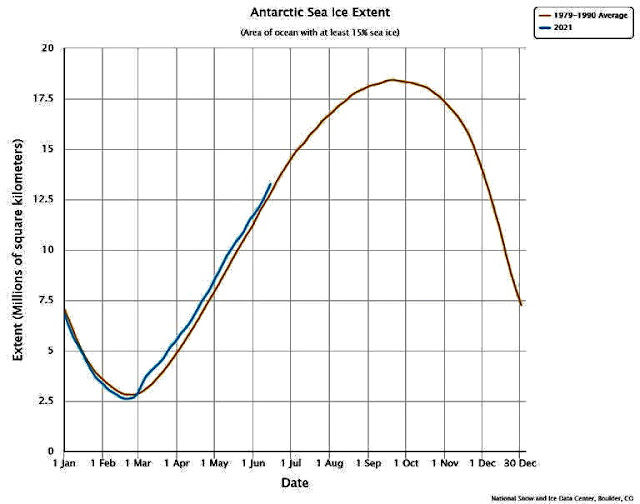"Antarctica is experiencing an unusually cold start to winter,
cold which is threatening to break the icy continent’s lowest temperature ever recorded–the -89.6C (-129.3F) registered at Vostok Station on July 21, 1983.
‘Spare a thought for the hardy crew who are wintering down in Antarctica,’ reads the opening paragraph of a recent newshub.co.nz article, ‘who are experiencing near-record breaking cold this week of -81.7C (-115F)‘–logged at Japan’s Dome Fuji Station.
Antarctica New Zealand science tech Jamie McGaw, who is camped 2,400km away from Dome Fuji, at Scott Base, says he “can’t even imagine that extreme cold”.
“I mean, the coldest I’ve experienced here, even in wind chill, is the -60Cs and that is pain — that is any bare skin exposed feels like it’s on fire.”
The continent’s average temperature has been holding some 10 degrees Celsius colder than usual this year.
As a result, Antarctic Sea Ice has been growing exponentially, and is holding above the 1979-1990 baseline:
has “kept all of these cold temperatures locked in over the Antarctic continent, and they haven’t been able to really push north — whether it’s to Australia, New Zealand or South America — they’ve been kind of stuck here.”
But this isn’t strictly true.
Recently, numerous polar outbreaks have managed to escape the icy continent.
And these have delivered record-breaking cold and snow to Australia, New Zealand and South America:
Professor John Cottle, Antarctica New Zealand Chief Scientific Adviser, said July is typically Antarctica’s coldest month of the year, with sea ice extent peaking around mid-September.
Given that we’re already seeing sub -80C lows in mid-June, this bodes well for both sea ice extent AND the chances of busting 1983’s all-time low of -89.6C.
I would love to watch AGW proponents explain-away that one.
McGaw and his team of 12, who are wintering at Scott Base, saw their last sunset of the season on the April 24.
They won’t see the sun again for another two months."
